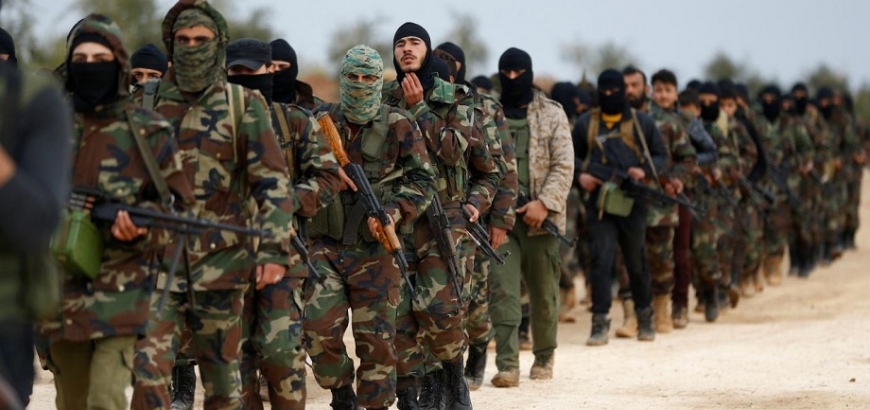Factions of the Free Syrian Army (FSA) are preparing to participate in a military operation, which Turkey has announced it intends to begin in the eastern Euphrates. The Yeni Safak newspaper said that 14,000 fighters from the opposition forces are preparing to enter the battle.
On Wednesday, Turkish President Recep Tayyip Erdogan said that within days his country would begin a new military operation east of the Euphrates in northern Syria, which would confront the fighters of the Kurdish People’s Protection Units (YPG).
The Yeni Safak newspaper said in a report on Thursday, translated by Alsouria Net, that the Turkish armed forces had asked FSA groups three days ago to prepare 14,000 fighters for the military operation east of the Euphrates, quoting its sources as saying that the FSA groups were requested to prepare weapons and equipment for the expected operation.
According to the same source, the FSA groups finished their preparations on Wednesday, coinciding with Erdogan’s announcement that his country intends to begin a military operation east of the Euphrates. The newspaper said that the 14,000 fighters would increase in number with the start of the attack, in addition to “commando” units and Turkish special forces, which would also participate in the operation.
First Stage of the Operation
Over the last two weeks, the Turkish army has bolstered its forces on the border with Syria, bringing in armed vehicles and tanks, as they have begun to prepare for the operation.
The Turkish newspaper said that the first stage of the eastern Euphrates operation would aim to strike strategic targets of the YPG, which Ankara considers to be an extension of the Kurdistan Workers’ Party (PKK), which both Turkey and the United States consider to be terrorists.
The newspaper added that during this stage YPG positions would be hit, as well as the routes used by their fighters, logistics bases and communications points, and that the operation is expected to result in “clearing 100 kilometers of the terrorist fighters,” as it put it.
The military operation should begin from the city of Tel Abyad which is on the Syrian-Turkish border. Yeni Safak said that after taking control of the city and expelling the YPG fighters, it would cut off contact with the city of Manbij.
American Forces Notified
Erdogan’s announcement of the planned eastern Euphrates operation stirred a swift American reaction, with Washington warning against any military action, saying that it “would not be acceptable.”
This came in a statement issued by the Pentagon spokesman, Sean Robertson, on Wednesday, in which he said: “Unilateral military action in northeastern Syria by any party, particularly as US personnel may be present or in the vicinity, is of grave concern.” He said that any “uncoordinated” military operations would undermine shared interests.
In this context, the Yeni Safak newspaper said that before beginning the operation officially, the American forces would be warned to stay in their areas away from the Kurdish forces, while Turkey would request coordinates of the areas where American forces are present (to keep them away from the strikes).
Previously on Thursday, the spokesman for the Syrian National Army, which is part of the FSA, Youssef Hammoud, said that the Turkish military operations against the YPG would “target the cities of Manbij in Aleppo, Tel Abyad in Raqqa, and Ras al-Ain in Hassakeh, and would include more than 150 towns and villages in northeastern Syria,” according to the SMART agency.
In September, Turkish media quoted Erdogan as saying that his country “would take measures east of the Euphrates in Syria and would impose a safe zone as was done in northwestern Syria.”
The Anadolu news agency quoted the Turkish President as saying that, “the steps that Turkey will take in the areas of the eastern Euphrates will resemble those taken in the Euphrates Shield and Olive Branch areas in northern Syria.”
This article was translated and edited by The Syrian Observer. Responsibility for the information and views set out in this article lies entirely with the author.


